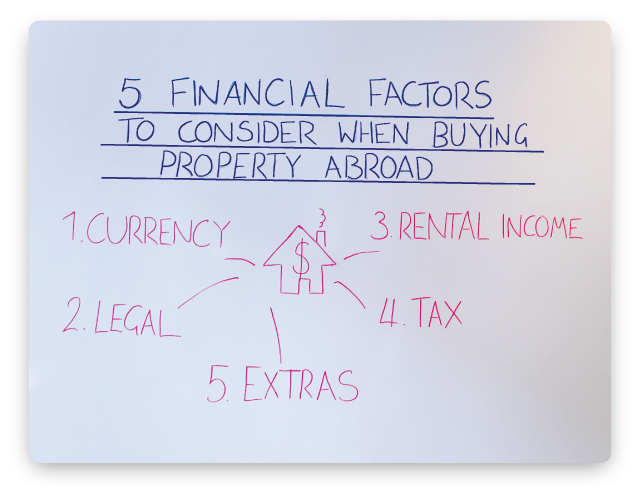
Buying overseas property can be a daunting and complicated process with a little more to think about than picking a beautiful home on the French Riviera or Majorcan coastline. In this video we have outlined the top financial implications to consider when buying overseas property so you can rest assured that everything is under control and you are maximising your money savings.
Good afternoon and welcome to yet another edition of MyCurrencyTransfer TV. So, buying a place in the sun is a dream for many. Recent reports suggest that Brits are buying again, with renewed confidence in the market and enquiry levels shooting up from 2012 levels.
In today’s video, we’re going to discuss 5 key financial factors to consider when buying property abroad. These include: currency, legal, rental income, tax & what we like to call, ‘extras’.

Currency
Knowing how to pay for your overseas property can be just as important as choosing which property to buy. Consider the most cost effective way of making an international money transfer. It won’t be the banks who apply hefty currency conversion markups of up to 5% away from the ‘real exchange rate.’’ Instead, compare non-bank foreign exchange brokers who can maximise on both the exchange rate, and timing of your payment. Consider the use of a forward contract that lets you lock in the exchange rate for payments in advance.
Legal
The golden rule is to never, ever sign a contract in a foreign language without having it checked over. It pays to hire a local lawyer, who understands the local law. There are many examples of horror stories of Brits buying property abroad that they are not actually legally entitled to. Check things like due completion date, legal rights, deposits & refunds. Off plan properties & those in certain restricted areas to foreign ownership need very careful due diligence.
Rental Income
Are you planning to rent out your overseas property? If so, check out what comparable properties are rented out for in the local area. Again, do your research in order to manage expectation. Work out the local tax laws in terms of how much you will be taxed on your foreign property and any related capital allowances that you may be able to take advantage of.
Tax
Perhaps you are retiring to your dream second home. Check out any inheritance and capital gains tax of the property you are buying. Laws vary in different countries. For example, in France, your children by default inherit rights to your house. In this scenario, if you choose differently, you may need to allocate a second will.
Extras
Lastly, consider other financial implications of the destination of your property abroad. Namely: how far is it from the UK & associated flight prices? How expensive is the local area & it’s proximity to local amenities? What are the travel money rates & how strong or weak is the currency?
To conclude, buying an overseas property can be a rewarding, but at the same time, overwhelming experience. With some careful planning & the right advice, you will be absolutely fine & celebrating one of the most fulfilling life experiences of all time!
We hope you enjoyed this episode of MyCurrencyTransfer TV. If you have any questions, feel free to tweet us on @currencytransfr OR you can email me directly at [email protected]
Have a great day!
Written by Sofia Kluge on Google+







